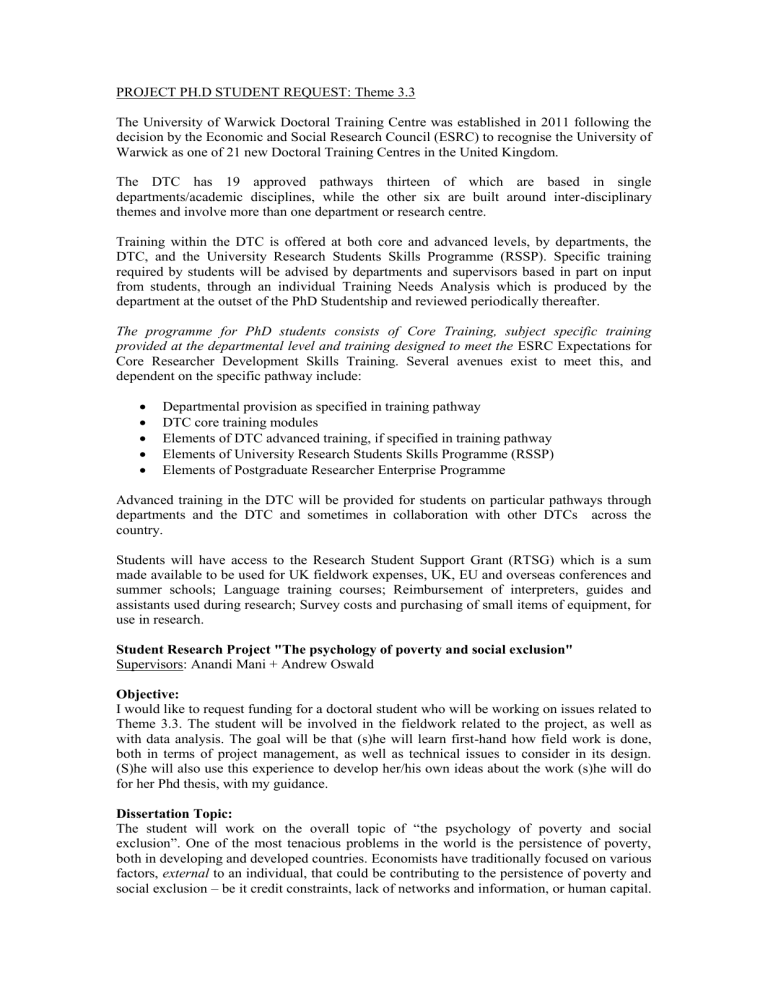PROJECT PH.D STUDENT REQUEST: Theme 3.3

PROJECT PH.D STUDENT REQUEST: Theme 3.3
The University of Warwick Doctoral Training Centre was established in 2011 following the decision by the Economic and Social Research Council (ESRC) to recognise the University of
Warwick as one of 21 new Doctoral Training Centres in the United Kingdom.
The DTC has 19 approved pathways thirteen of which are based in single departments/academic disciplines, while the other six are built around inter-disciplinary themes and involve more than one department or research centre.
Training within the DTC is offered at both core and advanced levels, by departments, the
DTC, and the University Research Students Skills Programme (RSSP). Specific training required by students will be advised by departments and supervisors based in part on input from students, through an individual Training Needs Analysis which is produced by the department at the outset of the PhD Studentship and reviewed periodically thereafter.
The programme for PhD students consists of Core Training, subject specific training provided at the departmental level and training designed to meet the ESRC Expectations for
Core Researcher Development Skills Training. Several avenues exist to meet this, and dependent on the specific pathway include:
Departmental provision as specified in training pathway
DTC core training modules
Elements of DTC advanced training, if specified in training pathway
Elements of University Research Students Skills Programme (RSSP)
Elements of Postgraduate Researcher Enterprise Programme
Advanced training in the DTC will be provided for students on particular pathways through departments and the DTC and sometimes in collaboration with other DTCs across the country.
Students will have access to the Research Student Support Grant (RTSG) which is a sum made available to be used for UK fieldwork expenses, UK, EU and overseas conferences and summer schools; Language training courses; Reimbursement of interpreters, guides and assistants used during research; Survey costs and purchasing of small items of equipment, for use in research.
Student Research Project "The psychology of poverty and social exclusion"
Supervisors: Anandi Mani + Andrew Oswald
Objective:
I would like to request funding for a doctoral student who will be working on issues related to
Theme 3.3. The student will be involved in the fieldwork related to the project, as well as with data analysis. The goal will be that (s)he will learn first-hand how field work is done, both in terms of project management, as well as technical issues to consider in its design.
(S)he will also use this experience to develop her/his own ideas about the work (s)he will do for her Phd thesis, with my guidance.
Dissertation Topic:
The student will work on the overall topic of “the psychology of poverty and social exclusion”. One of the most tenacious problems in the world is the persistence of poverty, both in developing and developed countries. Economists have traditionally focused on various factors, external to an individual, that could be contributing to the persistence of poverty and social exclusion – be it credit constraints, lack of networks and information, or human capital.
However, these factors do not fully explain several puzzling behaviors of the poor: why they are unwilling to use new technologies which they know to be safe, superior on yield and costeffective; why they fail to take advantage of programs intended to benefit them; why they are less attentive parents, tardy with appointments or keeping up with preventive health measures; why they lack hope and have a lower sense of self-efficacy in their ability to influence their life outcomes.
Under this research theme, the student will take part in research that examines whether many of the self-defeating behaviors of the poor may be due to constraints internal to an individual who faces poverty and social exclusion. An inherent challenge in addressing such internal constraints is whether they are a cause or consequence of poverty. The projects under this research agenda also address this question too, as part of the overall program. The projects focus on understanding the impact of poverty on cognitive and non-cognitive aspects of mental capacity.
All the projects involve a significant field research component: The work on understanding how poverty affects cognitive capacity will be done with sugarcane farmers in Tamil Nadu, in
South India. As part of this work, the student may be required to undertake field visits during the pilot phase of project implementation and accompany the survey team for interviews of the program participants. (S)he will be expected to play a similar role in the projects on psychological empowerment training in Kolkata, India. However, during the time when the term at Warwick is underway, (s)he will not be expected to travel to the field, in order to complete the required coursework. At such time, her/his role will consist of support on survey design, and if necessary, data analysis. (S)he will also be expected to become familiar with related literature from economics, psychology and other behavioral sciences, as needed.
This will also provide input for generating her/his own thesis ideas.
Statement of how this project is independent from, but will add value to, the principal objectives set out in the application
This sub-theme focuses on the question of well-being with a focus on poverty traps, but with a focus on a novel and understudied aspect of well-being: mental constraints associated with poverty. It confronts the politically charged question of whether behaviors of the poor that reflect low mental attention and tenacity -- be it inattention as parents, low productivity at work or a lack of hope and aspirations -- are a cause, or rather a consequence of poverty. It brings attention to the importance of specific aspects of mental well-being that programs designed to mitigate poverty need to be mindful of, and explores approaches to increasing these capacities among poor and marginalized individuals.
Year 1: Student will be enrolled in the PhD program having completed all prerequisite qualifications. (S)he will be expected to make substantial progress surveying the literature and making a decision of the set of questions to address. By the end of the year, (s)he should have made initial visits to the field and come up with an empirical strategy (if (s)he plans to work with data) or the elements of a conceptual framework.
Year 2: All empirical work should be completed. The first draft of one chapter of her/his dissertation should be completed.
Year 3: Student expected to come up with a first draft of a second chapter. Both chapters will be revised as necessary to become final. Thesis will be submitted at end of year.






